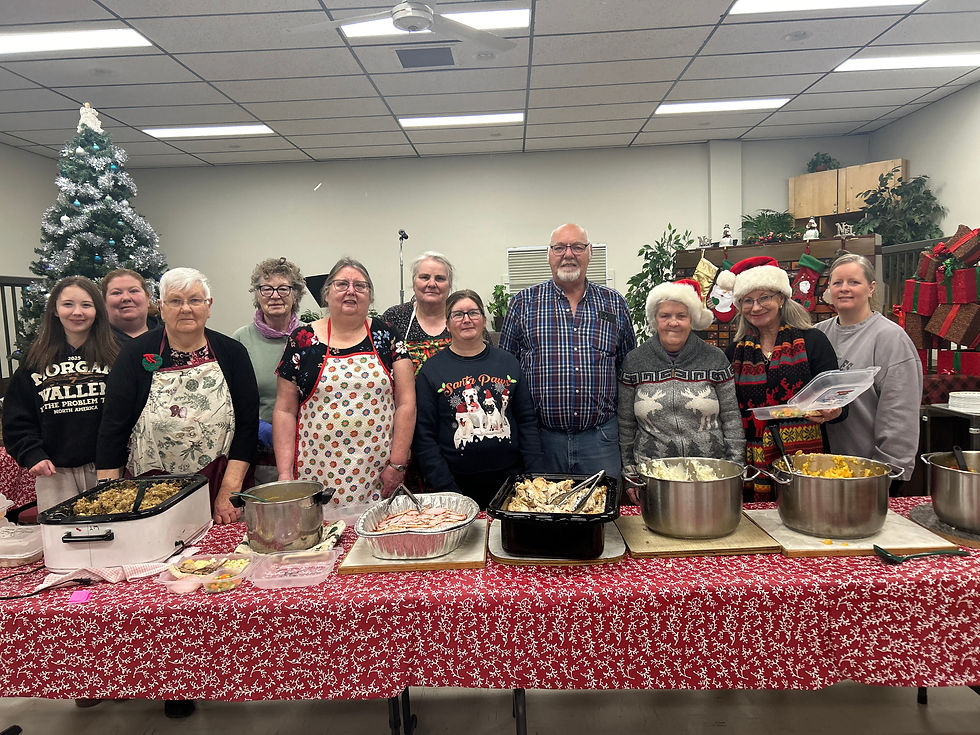Connect For Food Symposium Held At Regional Centre
- Vermilion Voice
- Apr 24, 2024
- 3 min read

On Monday, April 15, consultants Perry Phillips and Keleigh Cormier were members of a small team that hosted the first-ever Connect for Food Symposium at the Vermilion Regional Centre.
Each with decades of experience in agribusiness, Phillips and Cormier came together to found and create the Connect for Food process, which involves working with people, communities, and municipalities to help them advance the food sector. The two have held in-person and virtual workshops in east-central Alberta over the past few years, where five core themes have emerged.
First, the findings from the workshops showed that we need to take pride in producing and consuming our own food. A tagline for the process has emerged in the phrase “Grow what we eat. Eat what we grow.” Second, expectations need to shift regarding reliance on imported food. Third, communities need to adopt a culture of learning, leadership, and self-reliance. Fourth, we need to embrace complexity and accept that many solutions are not simple. Finally, our current agricultural model is based primarily on high production and the export of commodities, often providing low net returns. There may be more net return per acre in a local food model.
The symposium grew out of these findings and the recognition that the entire supply-demand continuum would need to be brought together to discuss barriers and solutions for creating a thriving food industry, locally and beyond. The organizers’ vision was to develop the foundation for an ongoing initiative that could carry on the work of what had been found in the previous workshops.
Nearly 120 attendees travelled from as far away as Sundre, Swan Hills, and west of Edmonton, some driving for more than four hours to attend the event. Vermilion was chosen for its “Goldilocks” characteristics: it had just the right facilities, local food producers, and support from local businesses to offer a sophisticated feel in a rural location.
The event itself had seven major components: an introduction and background to the Connect for Food process and local food systems by Phillips and Cormier; a keynote address by Bianca Parsons, Executive Director of the Alberta Food Processors Association; a panel presentation on the supply and demand continuum; a locally-sourced lunch expertly prepared by The Red Brick; a showcase of local producers and service providers; a Connect for Food Exchange featuring facilitated discussions on opportunities and barriers to success for a thriving food sector; and an optional tour of Lakeland College’s Student-Managed Farm powered by New Holland.
The Connect for Food Exchange split attendees into assigned tables to discuss either the “Grow what we eat” or “Eat what we grow” side of the organization’s key message. Participants identified items bought at the grocery store that could be grown, processed, or packaged locally but aren’t. Education and collaboration were highlighted as key components to solutions that could shift the rural economy away from the imports, exports, and non-local processing and packaging so common today toward localizing a more self-sustaining food wheel.
As imagined by Phillips and Cormier, the local food wheel connects the processing, logistics, marketing and access, consumption, innovation and technology, education and advocacy, financial, and production aspects of the food industry while recognizing the influence of economic, regulatory, environmental, political, globalist, and sociological factors. Cormier explained, “People can see themselves around the wheel; everyone can feel comfortable in bringing their opinions to the table to talk about food.” She continued, saying, “A lot of the discussions gave people hope because they were talking about opportunities and what can we work on together.” As Corinna Hawkes, Director of the United Nations’ Food and Agriculture Association’s Division of Agrifood Systems and Food Safety, explains, “The potential power of the agrifood system isn’t there until we bring all of the systems together to transform it. At the moment we are having separate conversations.”
Phillips and Cormier’s shorter-term objectives on top of developing an initiative involved people making connections and forging new relationships along the supply-demand continuum that may evolve into viable business relationships. Their hope is to be able to track these outcomes in the form of dollar values.
Ultimately, at the heart of all of this work is the recognition that a paradigm shift is needed to change the culture of food production. With an agricultural model based on macro crops, we tend not to think about integrating individuals into smaller-scale food production. However, given the opportunity for grassroots conversations about the future of food between stakeholders representing all facets of the food wheel, change is not only possible but welcomed.
This event was made possible through Community Futures and a grant from PrairiesCan. To learn more about Connect for Food’s upcoming events, visit their Facebook page or their website at www.connectforfood.ca




Comments